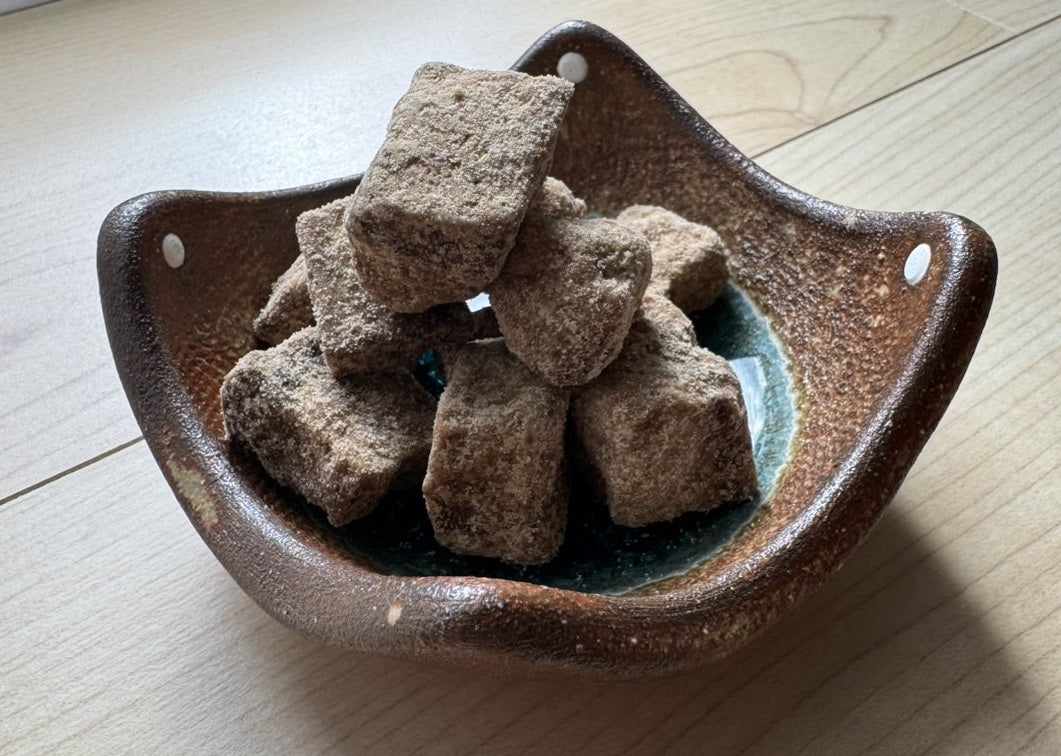What is Okinawan Dark Brown Sugar a.k.a. Kokutō?
Okinawan Dark Brown Sugar is known as Kokutō (pronounced ko-ku-TOW) in Japanese. Kokutō translates literally to “Black Sugar.” This name reflects the rich nutrient profile, deep flavors, and unique crumbly texture created through the sugar extraction process used in Okinawa.
Okinawan Dark Brown Sugar is a minimally refined, non-centrifugal cane sugar made by extracting and concentrating raw sugarcane juice until it forms solid dark brown blocks or chunks of sugar [1].
Compared with other more heavily refined brown and white sugars, Okinawan Dark Brown Sugar retains more minerals, polyphenols, and other natural plant compounds that may have antioxidant and other beneficial health effects [2][3]. Some research suggests eating it may help protect cells, reduce artery plaque, and improve saliva flow and overall oral health, among other potential health benefits [2][3][4][5]. With more naturally occurring nutrients preserved within it, Okinawan Dark Brown Sugar can be considered nutritionally superior to other more refined sugars and enjoyed in moderation as part of a healthy, balanced diet and lifestyle [2][4][5].
Kokutō has long been part of the Okinawan diet, a part of the world whose population is widely known for their longevity and strong overall health into old age [6]. Today, we can enjoy Okinawan Dark Brown Sugar as a natural sweet treat on its own or use it as a white sugar substitute in our home cooking recipes.
If you’d like to taste Kokutō for yourself, try Haitai’s Okinawan Dark Brown Sugar. It’s made and packaged in Okinawa!

Haitai's Okinawan Dark Brown Sugar Rocks

Haitai's Okinawan Dark Brown Sugar Powder
References:
- Asikin, Y., et al. (2023). Composition of minerals and volatile organic components of non-centrifugal cane sugars from Japan and ASEAN countries. Foods, 12(7), 1406. https://doi.org/10.3390/foods12071406
- Zidan, D., & Azlan, A. (2022). Non-centrifugal sugar (NCS) and health: A review on functional components and health benefits. Applied Sciences, 12(1), 460. https://doi.org/10.3390/app12010460
- Takara, K., et al. (2002). New antioxidative phenolic glycosides isolated from kokutō. Bioscience, Biotechnology, and Biochemistry, 66(1), 29–35. https://doi.org/10.1271/bbb.66.29
- Okabe, T., et al. (2009). Antiatherosclerotic function of Kokuto, Okinawan noncentrifugal cane sugar. Journal of Agricultural and Food Chemistry, 57(1), 69–75. https://doi.org/10.1021/jf802796m
- Supriya, S., et al. (2023). Effects of polyphenols in non-centrifugal cane sugar on saliva secretion. Journal of Clinical Biochemistry and Nutrition, 72(2), 171–182. https://doi.org/10.3164/jcbn.22-114
- Le Couteur, D. G., et al. (2020). Nutritional reprogramming of longevity: The Okinawa and Mediterranean diets. Geriatrics & Gerontology International, 20(S1), 27–32. https://doi.org/10.1111/ggi.14051


